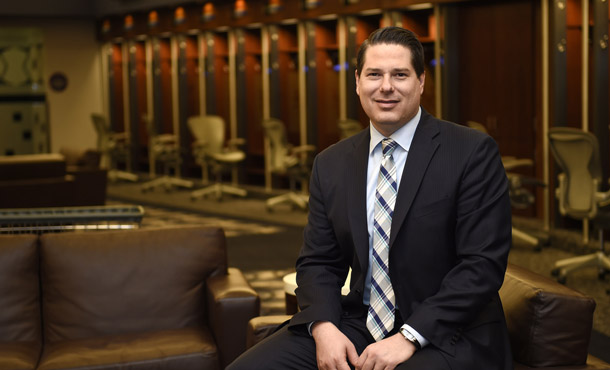When Kirk King graduated from Eastern Mennonite University in 1997, the longtime baseball player stepped off the pitcher’s mound for good and headed into an Oregon classroom as a middle school math teacher. A few years later, though, he was looking for a change.
That’s when he found an unlikely “ticket” to his dream career: working at a marketing company that specialized in teaching professional sports teams how to put fans in the seats.
Nearly 13 years later, King has worked his way up with the New York Mets from an entry-level sales position to his current position as group sales director, supervising 13.
Like any good pitcher hard at work, he was willing to bear down, learn a few new pitches, and look for weaknesses in the opposition.
Ticket sales are a good way to break into a tough job market, King said from his office at Citi Field in New York City. For those willing to endure low pay at first, high turnover can translate into upward opportunity.
There’s another lesson to be learned from Kings’ career path, too. You might be preparing for one batter only to face a pinch hitter. Be flexible and ready to change your strategy.
In 2001, King had been accepted to graduate school at University of California, Irvine. He had resigned from his teaching job and was just looking to fill the summer hours with a job that let him get a little closer to the sport he’d left behind in college.
While at Gameface, the sports marketing company in Portland, King decided he enjoyed the work and deferred his graduate school enrollment to stay in Oregon. Still there in the fall, he developed a rapport with marketing representatives from the New York Mets, who asked him to interview for a position.
Early in 2002, King moved across the country to start work as an inside sales representative for the Mets, giving up his grad school plans. He was an inside sales manager for two years and the season ticket and group sales manager for four years before moving to group sales.
King lives on Long Island with his wife, Susan, and two young children. He makes the drive of 30 miles one way to Citi Field.
He often stays to entertain clients for nearly all of the 81 home games, which sometimes means 14-hour days. He occasionally meets some of the Mets players. At a recent event, for example, clients greeted power hitter Mike Cuddyer, a Norfolk native who the Mets signed to a two-year contract from the Colorado Rockies.
“We allow some clients to interact with players. Season ticket holders get to attend chalk talks,” King said. “There is a division between baseball operations and business. The player’s time is so valuable, just from the media standpoint. We try to be targeted about how we go about asking for some of their time.”
King spent part of his youth in Lancaster, Pennsylvania, where his father was big on playing softball and took him to see the Phillies as his first Major League outing.
Now that he’s in the majors, so to speak, he is always looking to help others into the big show.
“He gave me my first chance in sports … He took a chance on me and he really gives me the ability to be a decision maker,” says Christina Andrews, a manager in group sales who is entering her seventh season with the Mets. “He trusts the people that he hires and that we will do a good job.”
King is praised by as a team leader by long-time colleagues such as Barry Gorman, manager of group sales.
“He certainly leads by example. He sets people up to be successful,” Gorman says. “I look up to him when it comes to how he runs his team.”
King recognizes that his career path, from middle school math teacher to temp work to ticket sales, is unique. “I was fortunate to jump right in at the Major League level. It was a perfect match. I realize my story is pretty unique. If you are going to progress in sports, you have to move around the country and take opportunities when they come. You probably have to move to get those opportunities. I was fortunate to stay.”

Good success story for an EMU graduate.